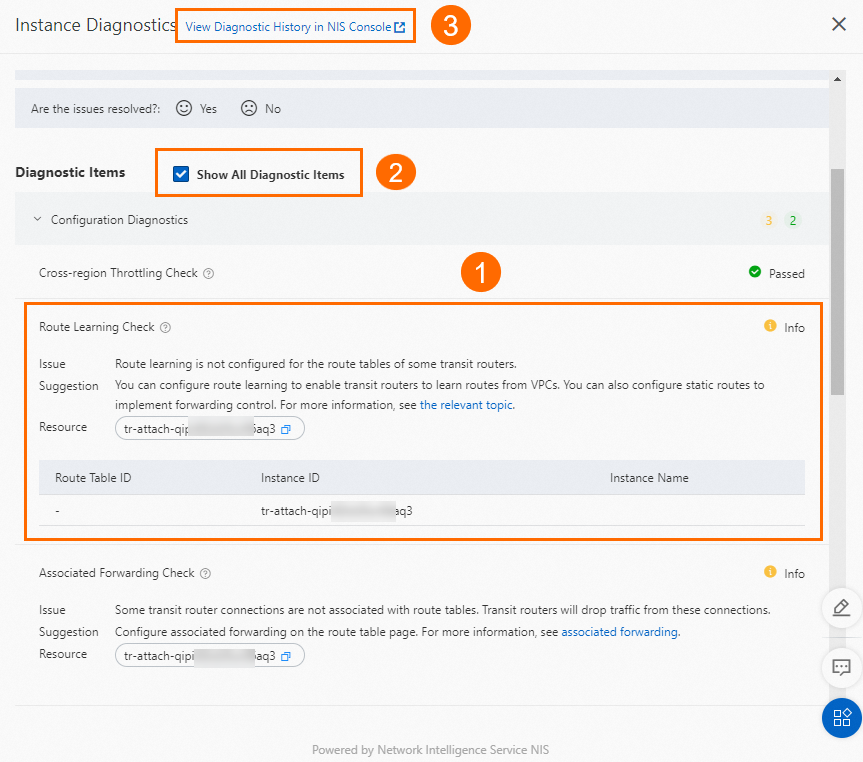Cloud Enterprise Network (CEN) is interfaced with Network Intelligence Service (NIS), which supports instance diagnostics and provides diagnosis results. You can use this feature to troubleshoot network errors on transit routers based on the diagnosis results.
Limits
This feature is supported only by Enterprise Edition transit routers.
Diagnostic items for transit routers
The following table describes the diagnostic items supported by transfer routers.
Category | Item | Description |
Configuration diagnostics | Cross-region Throttling Check | Checks whether a bandwidth cap is specified for the inter-region connections on the transit router. |
Route Learning Check | Checks whether route learning is enabled between the network connections on the transit router and the route tables of the transit router. If route learning does not need to be enabled between a network connection and the route tables of the transit router, make sure that a static route that points to the network instance exists in the route tables of the transit router. Otherwise, the transit router cannot forward network traffic to the network instance. For more information about route learning, see Route learning. | |
Associated Forwarding Check | Checks whether associated forwarding is enabled between the network connections on the transit router and the route tables of the transit router. For more information about associated forwarding, see Associated forwarding. | |
Check Network ACL Configuration | Checks whether the ACL allows requests from the CIDR block of the VPC vSwitch that is used to connect to the transit router. For more information about ACLs, see Network ACLs. | |
Automatic Route Advertising Check | Checks whether automatic route advertisement is enabled between virtual border router (VBR) connections and inter-region connections. If you want VBRs to automatically learn routes from the transit router and the local transit router to learn routers from the peer transit router, enable automatic route advertisement between VBR connections and inter-region connections. | |
Quota diagnostics | Route Usage Check | Checks whether the existing number of routes in the route tables of the transit router has reached 80% of route quotas. |
Cross-region Throttling Packet Loss | Checks whether each QoS queue of the inter-region connections has consumed 80% of the maximum bandwidth. | |
Cross-region Throttling Packet Loss | Checks whether the inter-region connections have consumed 80% of the maximum bandwidth. | |
Check for inter-region connection packet loss | Checks whether packets are dropped due to throttling on inter-region connections during the last 15 minutes. | |
Check whether the QoS queue of inter-region connections has packet loss | Checks whether packets are dropped due to throttling in QoS queues of inter-region connections during the last 15 minutes. | |
Payment diagnostics | Overdue Payment Alert | Checks whether the bandwidth plan associated with the CEN instance has an overdue payment. |
Alerts for Overdue Payments | Checks whether the bandwidth plan associated with the CEN instance is about to expire within seven days. | |
Route diagnostics | Route Conflict Check for Network Instance | Checks whether the routes of network instances connected to the transit router overlap with each other. |
VPC Routes | Checks whether all the destination CIDR blocks of routes in the route table of the transit router fall into the destination CIDR blocks of VPC routes that point to the transit router. The route table of the transit router refers to the transit router route table that is associated with the VPC connection. |
Start a diagnostic
Log on to the CEN console.
On the Instances page, click the ID of the CEN instance that you want to manage.
On the tab, find the transit router that you want to manage and click Diagnose in the Instance Diagnostics column.
In the Instance Diagnostics panel, view the diagnosis details.
NoteIf NIS is not activated, select Terms of Service for Standard Edition NIS and click Activate NIS free of charge to diagnose instances.
If this is the first time that you perform a diagnostic, the system automatically creates the service-linked role AliyunServiceRoleForNis. For more information, see Service-linked roles.

No.
Description
①
Anomalies are displayed in the Instance Diagnostics panel. You can view the diagnosis description, relevant resources, and suggestions.
②
In the Diagnostic Items section, you can select Show All Diagnostic Items to view all diagnostic items and the results.
③
On the right side of Instance Diagnostics, you can click View Diagnostic History in NIS Console to go to Overview page in the NIS console. Then, you can view the diagnosis reports of the transit router. For more information, see Use features on the Overview page.
References
For more information about NIS, see Work with instance diagnostics.